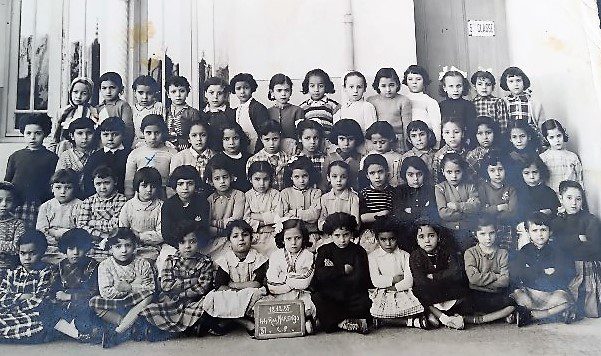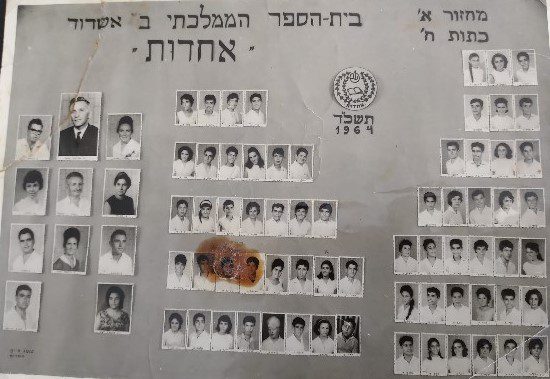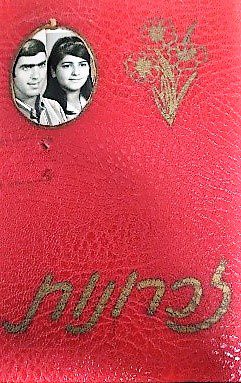Aunt Arlette, sister of my grandmother Z'anin
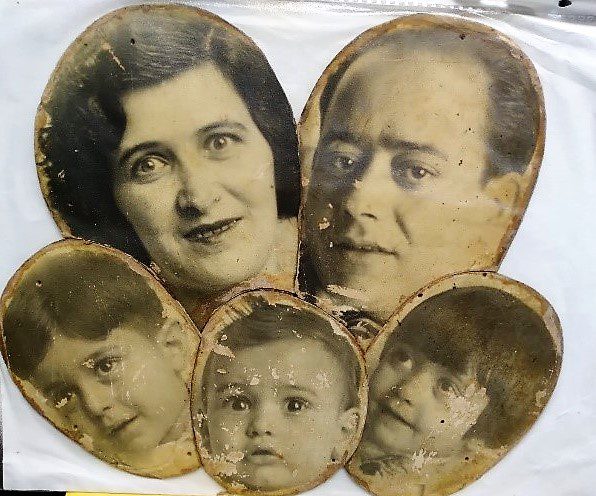
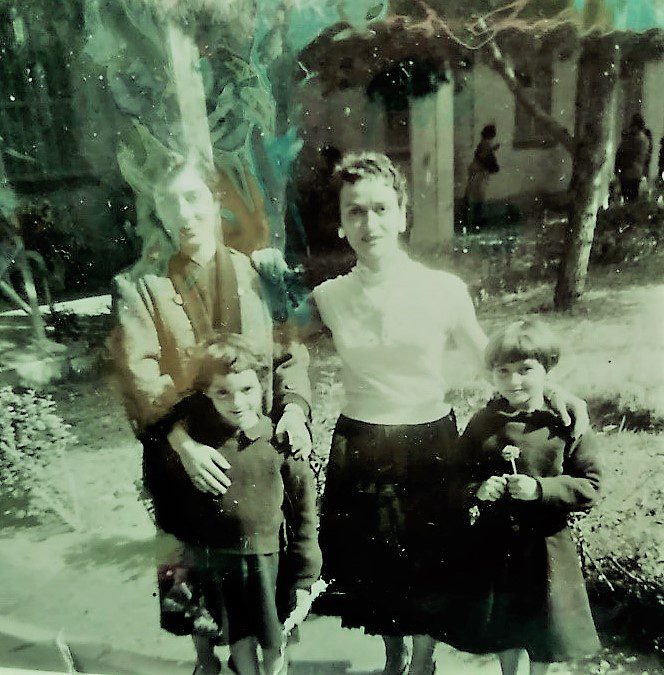
Aunt Arlette, sister of my grandmother Z'anin R.I.P
The people in the picture are my mother's aunt Arlette, my mother's cousin and her friend.
The picture I chose is a picture of my mother's aunt who was staying at a rest home due to her being very thin in Algeria.
The picture was taken when Arlette was 8 years old, her mother took care of her health so she sent her to a rest home.
The rest home is located in the mountains where there is fresh air, sun and sea, she stayed there for a year, the old houses in Algeria were adjacent to each other to protect from the hot sun. her family would come visit her once or twice a week, she would have been waiting for these visits impatiently.
I chose this picture because I was interested in where the picture was taken, who was with her in the picture and why they were there too, then I found out that it was taken in 1958 in a rest home called "Jean Bart".
What I wanted to ask her is if this place helped her, if it was hard to see her family only once a week and what she and her family did when she was there.
Childhood
From my childhood, I remember my home country of Algerian. We had a very pleasant time there, there was sea, forests, we lived in peace.
We hiked and spent every Sunday to a different area. The weather was like in Israel. The Arabs stood up and sought their independence from the French who ruled them. It was scary and very dangerous for us and we had to drop everything and immigrate to Israel. We immigrated, my parents, brothers and sisters to Israel in 1961. Remember very much the first ship from Algiers to Marseilles. We had a night of nightmares. There were high waves and the ship was shaking all the time and we were vomiting endlessly except for my father who was a seaman and was normal and if it didn't bother him.
From Marseilles, France, we sailed to Israel on the ship "Theodor Herzl" (a liner that the Germans gave to the Israelis in exchange for the scourge during the Holocaust. The sailing was exciting for us. 4 days of fun. I was then at the age of 11 and a half, we met children our age who became our neighbors and that we were friends to this day. Dad taught me to waltz on the ship.
We came to Israel for Ashdod at night. When we got up in the morning Ashdod was just sands and some buildings. There was no electricity, no gas, no solar heater, just water in the tap. We needed a pole in line to buy oil for the wicks that would be used for light, cooking and heating water for bathing. We would buy ice to cool the food that would not go bad and also for cold water. We stayed for a few months until the electricity reached both homes and the streets.
We had no electronic games, no Internet and no phone. We played with Calais, rope, dodgeball and seven stone. I was very fond of parking because it was hard to disqualify me. Seven stones was also a game of 2 teams. They had to drop the stones placed on top of each other with a bullet. One group kept the stones from rebuilding them. Anyone who came close would have hit him with a bullet and he would have been disqualified. When the ball was sent and didn't hit the boy we would run to the stones and raise them again. The team that succeeded is the winner. That's how we played for hours.
We'd get on dunes across the street from the house, surfing with a plastic bag up to the veil. We were very happy. It was very difficult for the parents to acclimatize to the current situation because my father had a business and my mother worked as a secretary at the French recruitment office in Algeria. We had a housekeeper who took care of us and the house and this is where Mom had to do everything on her own. Not knowing the language also made it difficult for them.
My father had to provide for seven lives alone. We ate meat just to sit down. The parents had to get along. Mom made a different soup every day that filled our stomachs. At school, they'd give out a bottle of milk at 10:00 and we'd eat at the school restaurant at noon. Sometimes delicious and sometimes less so.
We had a good relationship with the parents. They explained everything to us and understood the situation. I was the older sister (number 2) and helped mom who was a little depressed about the situation. I took care of my little sister. I would do cleaning at home and also laundry by hand because there was no washing machine and helpful in cooking because I really liked baking and cooking even though we didn't have an oven. We used a round mold with a hole in the middle called "Palestinian oven" where we baked bread and cakes on the wick and on the gas stove.
We came to Israel with a car and Dad drove us to all sorts of places we would know the country. One day he made a mistake on the way to Jerusalem and entered the Jordanian border. Lucky he understood what it said in English otherwise we would have entered Arab territory. Some time later he couldn't maintain the car and we had to give it up.
We lived in 48 sqm for 7 people, 2 1/2 rooms. It was very crowded. It was hard to do lessons because the little brothers were disturbed. Dad set us up with a desk on the little porch and we'd be reclusive there. Dad knew how to fix anything. He was also a painter and worked as an independent in homes. I'd really like to look at him and learn from him. Mom was more of a woman of education, morality, religion and she had tremendous patience. She's known a lot of proverbs that accompany me to this day.
The weather in Ashdod is hot and wet. We didn't have an air conditioner. In summer we died of heat and in winter it was very cold because the buildings were not built for the cold and the heating did not help so much. The fans haven't stopped working. Occasionally there were storms where the whole house filled with sand.
At home, Mom spoke French to us. My sister, who came to a baby, learned the language and would translate to mom what she learned in kindergarten. We won another language because of it otherwise we would have forgotten French. I left the country at the age of 30 with my husband and children to France, and thanks to it I was immediately able to get used to French, which was my mother tongue and helped my children read and write. To this day, I count and read books more easily in French. I studied Hebrew when he came to Israel and studied until 12th grade and professional matriculation.
My brothers and I had a difficult childhood but it only strengthened us and taught us to fight for a living and not take everything for granted. I'm not sorry about every moment I've been through. I've learned to deal with all the situations I've had throughout my life always with optimism, smiling and loving life. That's the message I'm sending to my children and grandchildren.
My Grandmother's School Years
The story will begin when she was in Algiers, Algeria, where she was born. There was a French regime that ruled Algeria. she learned French with the Arabic and Christianity children. In kindergarten, she studied boys/girls in sects. When she moved to first grade, classes were in girls' schools and the boys went separately. The orders were tough at the time. she had to come wearing an apron over the clothes.
There was a daily/weekly review of the nails cut and clean, the head (lice or lice test) the lower ones are clean. Shiny shoes. SHE used to write with ink that was placed on the side of the desk writing there were no pens then and it was very difficult to write without getting the notebook dirty. she had a special absorbent paper that she placed under the hand at the time of writing. Those who did not keep a clean notebook would stick the notebook in her back during recess and all the girls mocked her (nightmare !!!).
Those who did not behave or did not learn the lesson, the teacher would give a beating with a ruler on her toes, it would hurt a lot.
she had to memorize classical songs by Lafontaine and recite them in front of the class like a play.
The whole multiplication board she had to know by heart that if she woke us up in the middle of the night and asked how much it was 9×9 she could answer without thinking.
In history, she had to know important dates about the birth and death of governors or kings who ruled France, when the French Revolution was, and so on. When she entered the classroom, she would enter quietly in the classroom and not sit until the teacher gave an instruction to sit down. If the headmistress or someone grown up came into class, she get up and say hello.
Classes began at 8 a.m. until 12:00 P.M. she would go home and come back at 2pm until 5pm. She had a Wednesday off. SHE used this day to teach Allianz lessons in Hebrew. She also had Saturday afternoon and Sunday free.she would go on holidays of the Christian holidays and would allow to take time off Jewish holidays.
Despite the tough regime, she don't regret for a moment because they ended up getting good students out. There was a great honor for the teacher
When she arrived in Ashdod in 1961 she was 11 and a half years old. she went to unity school. They put her in fifth grade. she lost a class to acclimatize and learn Hebrew.
she went to a mixed class with the boys. During the morning break at 10.00 they would give to them small bottles of cold milk. It was very tasty. she drank it with the sandwich she brought from the house. At 1:00 P.M. ,she go to the school restaurant.
she studied painting lessons, sewing and embroidery. she learned to cut and sew a shirt and embroider over it. At the end of the year they were proud to wear their handiwork.
When she moved to Comprehensive A High School in Ashdod, she were forced to wear a uniform. The skirt was dark blue with pleats and the shirt was light blue. The outfit was intended for equality of social class. she had "Gadna" classes. she also had to wear outfits similar to military clothes.
she went on a national service job at Kibbutz Karmiyah near Ashkelon, where she worked picking oranges and grapefruits that were intended for export. Through the Gadna, she went to the Sde Boker camp that prepared here for the army.
Classes started at 8:00 A.M. and sometimes until 3:30 P.M. she didn't have a restaurant in high school and had to bring sandwiches from home or waited until she got home to eat. she usually had a sandwich with harissa (spicy) which she bought from the grocery store in the area. She was a good student and she got to get a book about sanctifying the name.
her favorite teacher was “Miriam Eitan” she let her work in great freedom in the office of her husband Attorney Dov Eitan. she loved the teachers and she got the best education and education from them for her future.
Her school in Algiers was very different from my school because we study boys and girls together and don't check us a strict cleaning test, teachers don't beat us up if we don't know the answers. We also never wrote in ink pen.
I was very interested in hearing the stories that's how I learn about my grandmother and her childhood.
My grandmother's bracelet
My grandmother received a bracelet from her grandmother's grandmother.
She says her mother got it from her grandmother and asked her to keep it, and give it to the first daughter to get married. My first grandmother who got married and was asked to keep it and pass it on from generation to generation. My grandmother wears it at important family events. She wears it to every bride in the family on henna day.
The bracelet is made of pure gold in the image of the Queen's Crown, it has green diamonds and breastplate stones. The bracelet is very expensive and is said to have been cast by hand
He is special to her because he is passed down from generation to generation and she was chosen to keep him until she passed it on to her eldest daughter.
Book Of Memories
A memoir that began in 1967.
I met my partner Albert after the Six Day War in July 1967. We started dating together on 23/09/09. He bought me this book of memories to write about our experiences. He was still a rookie in the military and I would wait for him to come once every two weeks.
At the end of his military service I prepared a table of despair and every past day I recorded an X until the big day he was released.
I initially wrote to myself that one day I would read the story of my first and last love that lasted 43 years. I save it for my children and grandchildren to read the story. I wrote in it until my second son was born but, then the pages ran out and I stopped.
It is special to me because it is a souvenir from my deceased husband and also every time I read it I can remember things that were sometimes forgotten. Thank you Noam that thanks to you I am once again looking at my diary that was on the shelf waiting for someone like you to bring up memories for me.
הזוית האישית
Noam: A very informative and interesting work.
Arlette: Fun to tell the younger generation what we went through.
מילון
אלבום זכרונותהיה נהוג לרכוש אלבום מיוחד ולתת לחברים, בעיקר מהכיתה, לכתוב ברכה או זיכרון שיישמר לשנים
ציטוטים
”. I've learned to deal with all the situations I've had throughout my life always with optimism“






